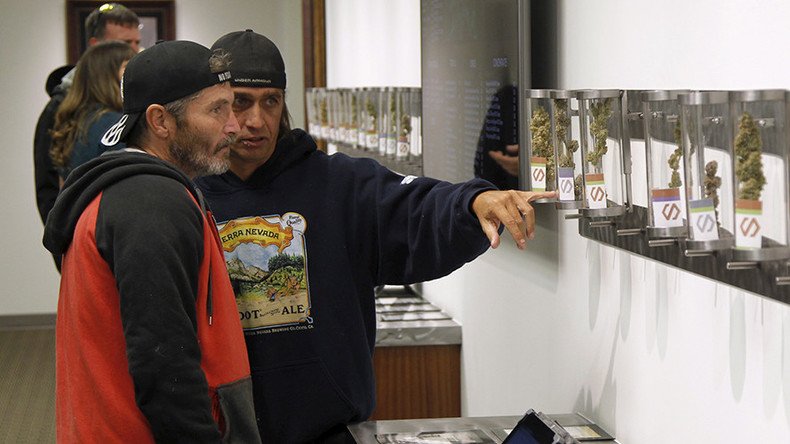Marijuana users 5x more likely to develop alcohol addiction – study

People who smoke marijuana are five times more likely to develop an alcohol problem, according to a new study by two New York universities. The research also found that cannabis makes it more likely for existing alcohol use disorders to persist.
“Our results suggest that cannabis use appears to be associated with an increased vulnerability to developing an alcohol use disorder, even among those without any history of this,” Renee Goodwin, associate professor of Epidemiology at the Columbia University's Mailman School of Public Health, said in a statement.
“Marijuana use also appears to increase the likelihood that an existing alcohol use disorder (AUD) will continue over time,” she added. Both alcohol abuse and dependence fall into the category of AUD.
The researchers analyzed data from 27,461 adults enrolled in the National Epidemiologic Survey on Alcohol and Related Conditions who had first used marijuana at a time when they had no history of AUDs. Each person was assessed at two points in time.
The study authors discovered that adults who had used marijuana at the first assessment and again over the following three years were five times more likely to develop an alcohol use problem, compared to those who had not used marijuana.
Additionally, adult problem drinkers who did not use cannabis were significantly more likely to be in recovery three years later, compared to people with AUDs who used marijuana.
The researchers have called on additional studies to determine whether youths are affected in the same way as adults.
“If future research confirms these findings, investigating whether preventing or delaying first use of marijuana might reduce the risk of developing alcohol use disorders among some segments of the population may be worthwhile,” Goodwin said.
The study, conducted by researchers from Columbia University's Mailman School of Public Health and the City University of New York, was published in the journal Drug and Alcohol Dependence.
The research is supported by a separate study published in the journal JAMA Psychiatry on Wednesday, also affiliated with Columbia University. That study found that adult marijuana use was associated with a greater likelihood of developing alcohol and drug problems, including nicotine dependence, over three years of follow-up.
“This new finding raises the possibility that the recent rise in marijuana use may be contributing to the coincident rise in serious harms related to narcotics and other drugs of abuse,” said lead researcher Dr. Mark Olfson, a professor of psychiatry at Columbia University Medical Center, as quoted by HealthDay.
That research examined nearly 35,000 adults interviewed three years apart for the National Epidemiologic Survey on Alcohol and Related Conditions. Almost 1,300 of those adults used marijuana.
Two-thirds of users had some form of substance use disorder three years later, compared to less than 20 percent of those who didn't use marijuana in the previous year.
“Those who used marijuana once or more a month had the highest rates of substance use disorders at follow-up,” Olfson said.
At the three-year follow-up, cannabis users were about six times more likely to have any substance abuse disorder, nearly three times as likely to have an alcohol disorder, and about 10 times as likely to report any marijuana use disorder. Cannabis users were also nearly twice as likely to report nicotine dependence.
He stressed that although the study cannot prove that cannabis caused the addition problems, the possibility should be considered.
“In the ongoing national debate concerning whether to legalize recreational marijuana [in the US], the public and legislators should take into consideration the potential for marijuana use to increase the risk of developing alcohol abuse and other serious drug problems,” Olfson said.














